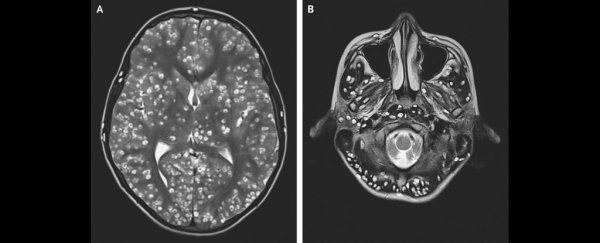When an 18-year-old man arrived at a hospital in Faridabad, India, complaining of seizures and pain, it's difficult to know what he was expecting. But it can't have been worse than what doctors found in an MRI scan: his brain was absolutely riddled with cysts.
And not just any cysts. He had a condition called neurocysticercosis, caused by one thing: infection by the parasitic pork tapeworms Taenia solium. Each of those cysts in the patient's brain was caused by a single tapeworm larva.
Severe cases of neurocysticercosis can be fatal. This was an unusually severe case.
According to a report in the New England Journal of Medicine, the patient was brought to the emergency department by his parents.
The young man had been experiencing seizures, and was confused. His parents informed the doctor that he had been experiencing pain on the right side of his groin for a week.
After examining the patient, the doctors ordered an MRI and ultrasound exams. The horrific results showed that the patient's cerebral cortex, cerebellum, and brain stem were full of encysted larvae, called cysticerci. Ultrasound also revealed cysts in the right testicle, and the right eye.
T. solium infection is called cysticercosis when the parasite infects muscle tissue, and people can be infected for years without experiencing symptoms. The condition gains the name neurocysticercosis when the parasites spread to the brain, creating the lesions you see in the image above.
Usually, there are not so many of them. The young man's case was so severe that his doctors couldn't even administer the usual antiparasitic medications, since they can exacerbate the host inflammatory response to the parasites. In the case of this patient, that could have worsened the swelling in his brain.
Instead, the team administered a corticosteroid to try to reduce the inflammation, as well as anti-epileptic medication to try to control the seizures. Both of these are known and common medications for treating neurocysticercosis.
Tragically, his infection was too advanced, and the man died two weeks after his visit to the hospital.
Neurocysticercosis is what is known as a "neglected tropical disease," endemic to low-income populations, and specifically linked to poor sanitation.
It can spread when humans ingest pork tapeworm eggs - usually by drinking water contaminated by the faeces of someone who already has the infection, or eating undercooked pork, according to the World Health Organisation.
It's common across Latin America and Asia, and is emerging and spreading in Sub-Saharan Africa.
The case was reported in the New England Journal of Medicine.
